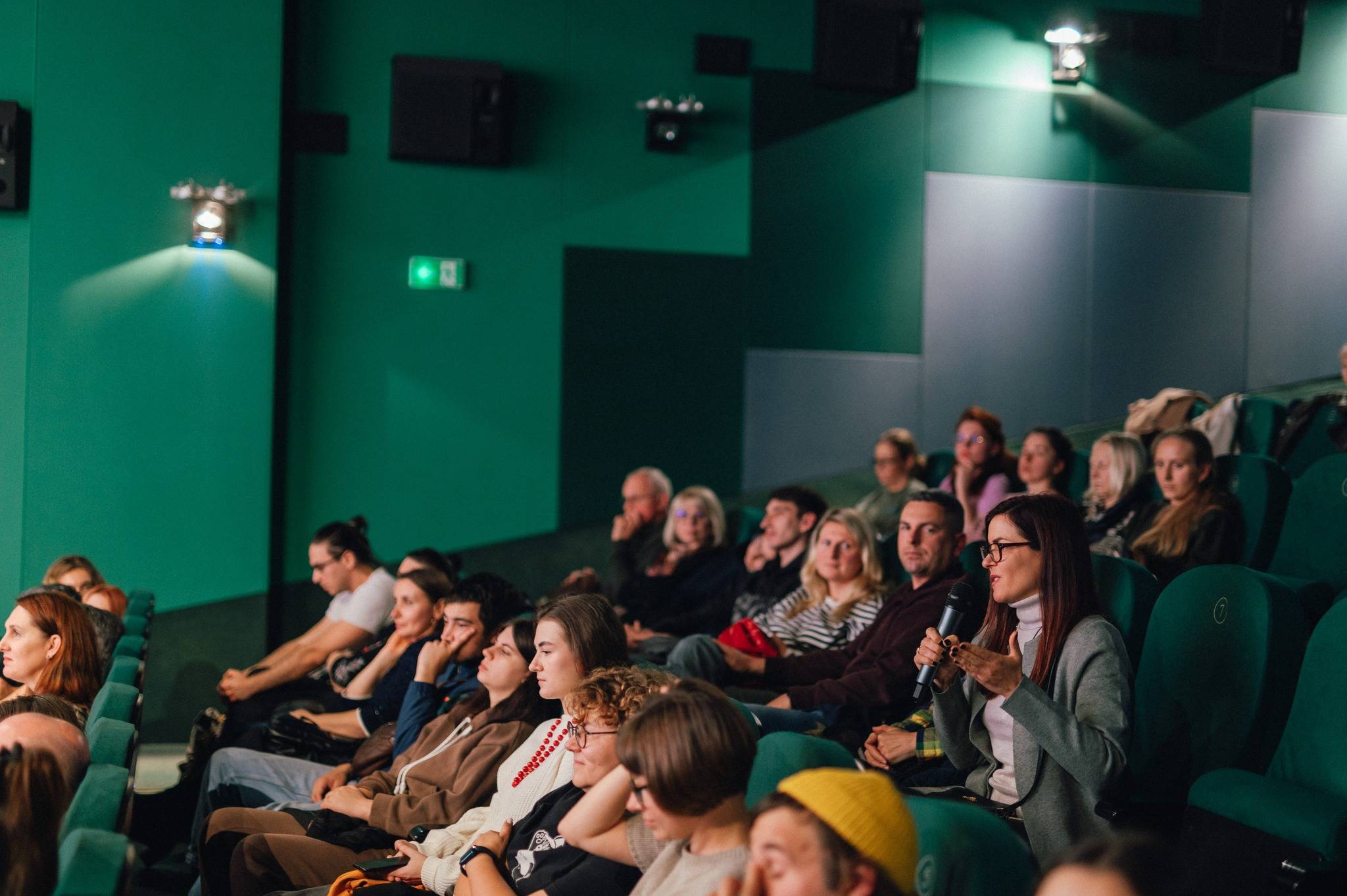
One year ago the manuscript of my first book has already been completed. It was in the process of review by a professional editor. That was a moment when I allowed myself to imagine that my book would be shortly published and I would be able to talk more about it to its future readers.
Since then I started attending all available meetings with “true” writers [here I refer to those with published books] to explore how those events look like:
how the writer's meetings are structured: are they moderated and if so how does it work; do they read the episode from the book; do they interact with the audience and how; do they have autograph session; and what are the other elements of the venue
what is the audience and atmosphere
which emotions do I feel during such an event
is there any difference between events with seasoned professionals and less experienced writers
Thus, it was a wonderful coincidence that the first three events I had a chance to attend were completely different: debutant writer, professional writer with numerous published books, and famous writer whose book made a great impression on me.
Evening with Larysa Rudak, debutant writer
This was the first and special event because it was the only case when I was acquainted with the author personally, although we were not close. I found out about the event from our mutual friend at the last moment. That’s why I went to the meeting without reading the author’s book and without even knowing what it was about. That fact didn’t stop me from feeling a bit anxious as if I had to make a public speech instead of just listening to it. This strange excitement never left me until the very end of the event. It was triggered by some kind of empathy or solidarity with the writer’s debut.
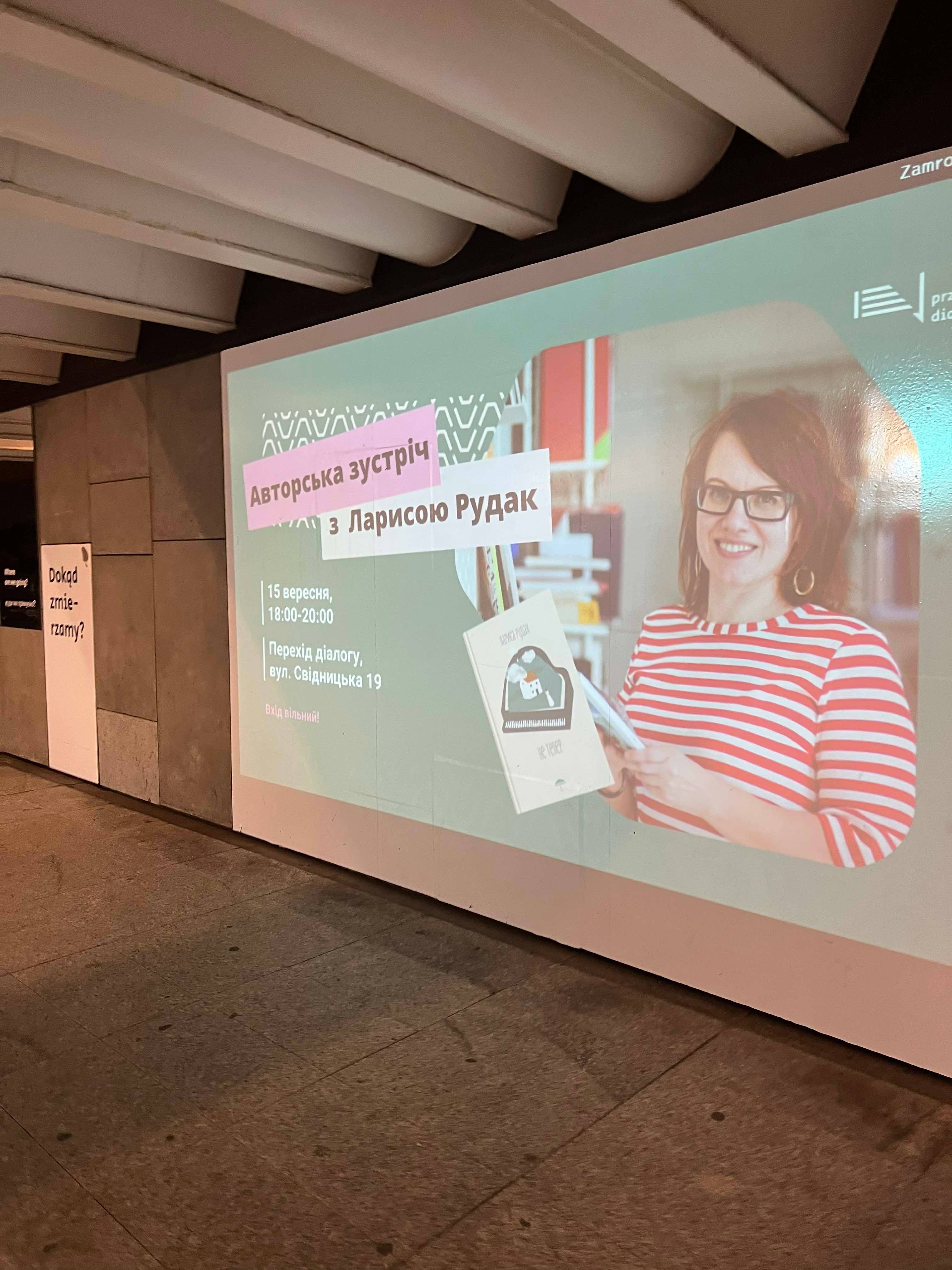
During the whole journey to the place of the event, I was imagining how the meeting would run. I was reflecting on the question I would like to ask Larysa. Obviously, I had a ton of questions coming to my mind but I decided to choose one that bothered me the most at that time: I would like to ask how Larysa negotiates with her inner critic, how she speaks to it, so that it doesn’t disturb her in making steady progress with the book. Occasionally, I concluded that for any next event, I will practice preparing questions, because it is a unique opportunity to find out some insights about the book or the process of its creation which might not exist under other circumstances. Especially now, when I'm exploring things around writing.
The meeting took place in a pleasant bright space, which was full of people. “The space which is full of women”, I paid attention. In a moment, when the event’s moderator made an introduction and started asking the first questions, I understood what the book named "Not Now" was about and immediately it became clear why the audience was rather female. The major theme of the book — maternity and a strong desire of a woman to realize herself in something beyond it. Such a soft, positive, and understandable topic.
After a facilitated discussion, the writer read a piece of her book. It was also an interesting experience. I caught myself in thought: what a person feels reading her text aloud in front of an audience? It’s like making your characters alive, giving them a voice. The voice the writer meant, writing it. Amazing!
Next, it was time for the questions from the audience. The guests said a lot of warm words, shared their own reflections regarding maternity and the book, and queried what they wanted to know. I also asked questions I prepared, but maybe due to the overexcitement, it is hard to remember the exact answer now.
The event ended with signing the books and photo session with Larysa.
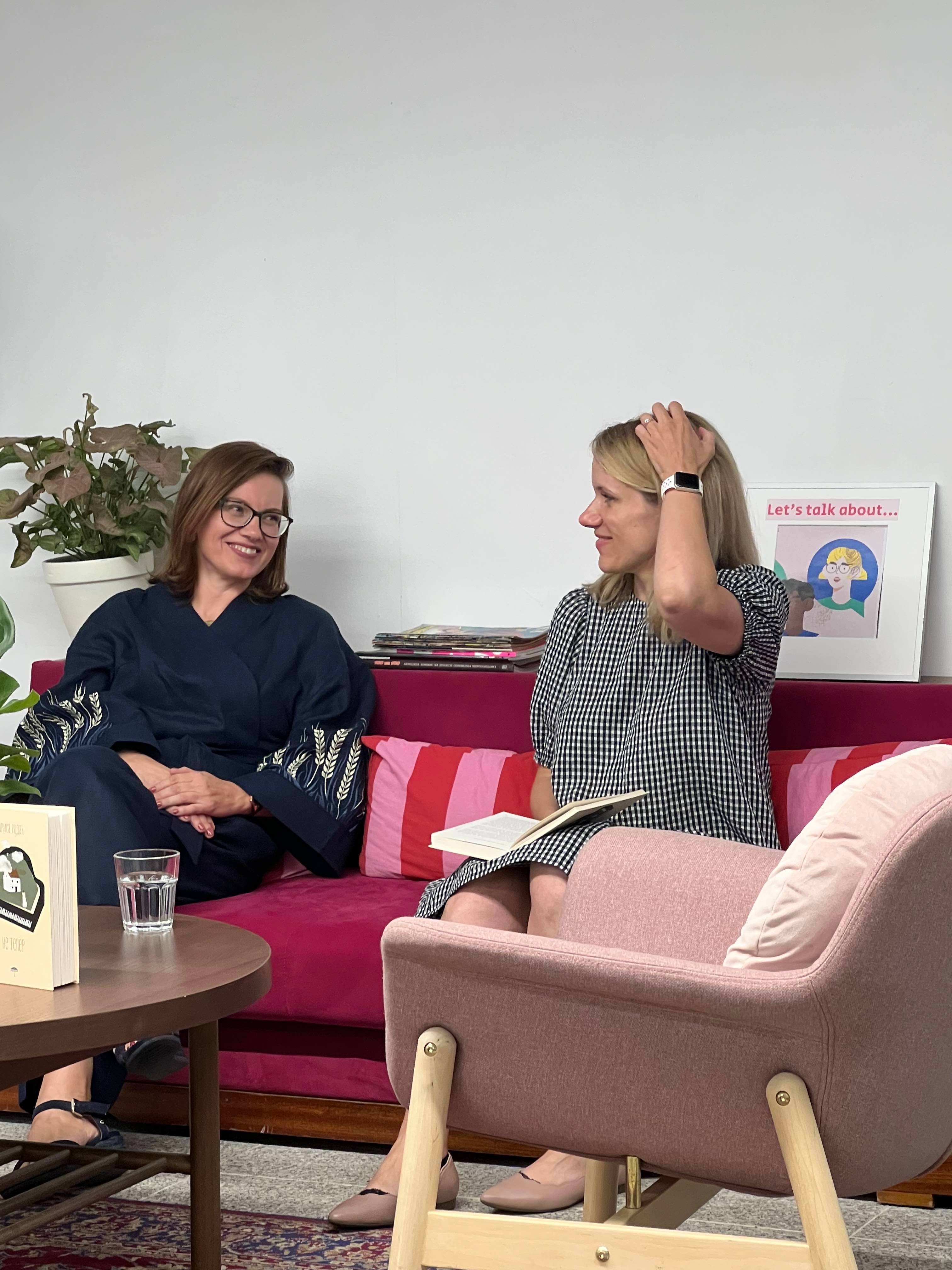
This writer's evening I remember well for its amicable, supportive, even intimate atmosphere. The audience literally pulsated with empathy, as the majority of attendees were mothers and the challenges of maternity covered in the book were very familiar to them. The rest of the listeners were young writers or Larysa’s friends who also sincerely cheered for her. I could feel it in the air. Similarly, I felt the debutant writer was a little bit anxious and embarrassed because she was not yet used to the public attention and the role of a “true” writer. In my personal view, this moment is very cute as it translates openness and amiability to the world. I believe, some experienced writers lose this “debutant” openness and modesty over time.
Evening with Max Kidruk, author of numerous books
The next meeting I had a chance to attend was with an experienced writer. Max Kidruk was on tour with his famous “Colony”. This time I also didn’t have a chance to read the book beforehand as I bought it straight at the venue. However, I planned to visit this event for a while, so I explored the plot in advance. Certainly, I prepared some questions for the writer.
This event was completely different from the previous one by its accessibility, format, and atmosphere.
First of all, in order to attend the presentation of the “Colony”, one should enroll in advance and get an email confirmation from the organizers.
The event took place on the terrace of the book cafe and all seats were taken. This time, the audience was preliminary female, but there were some men too. The high percentage of youth in their twenties was noticeable. Surprisingly, they were not scared by 897 book pages. I would carefully assume that they were attracted by the popular science fiction genre.
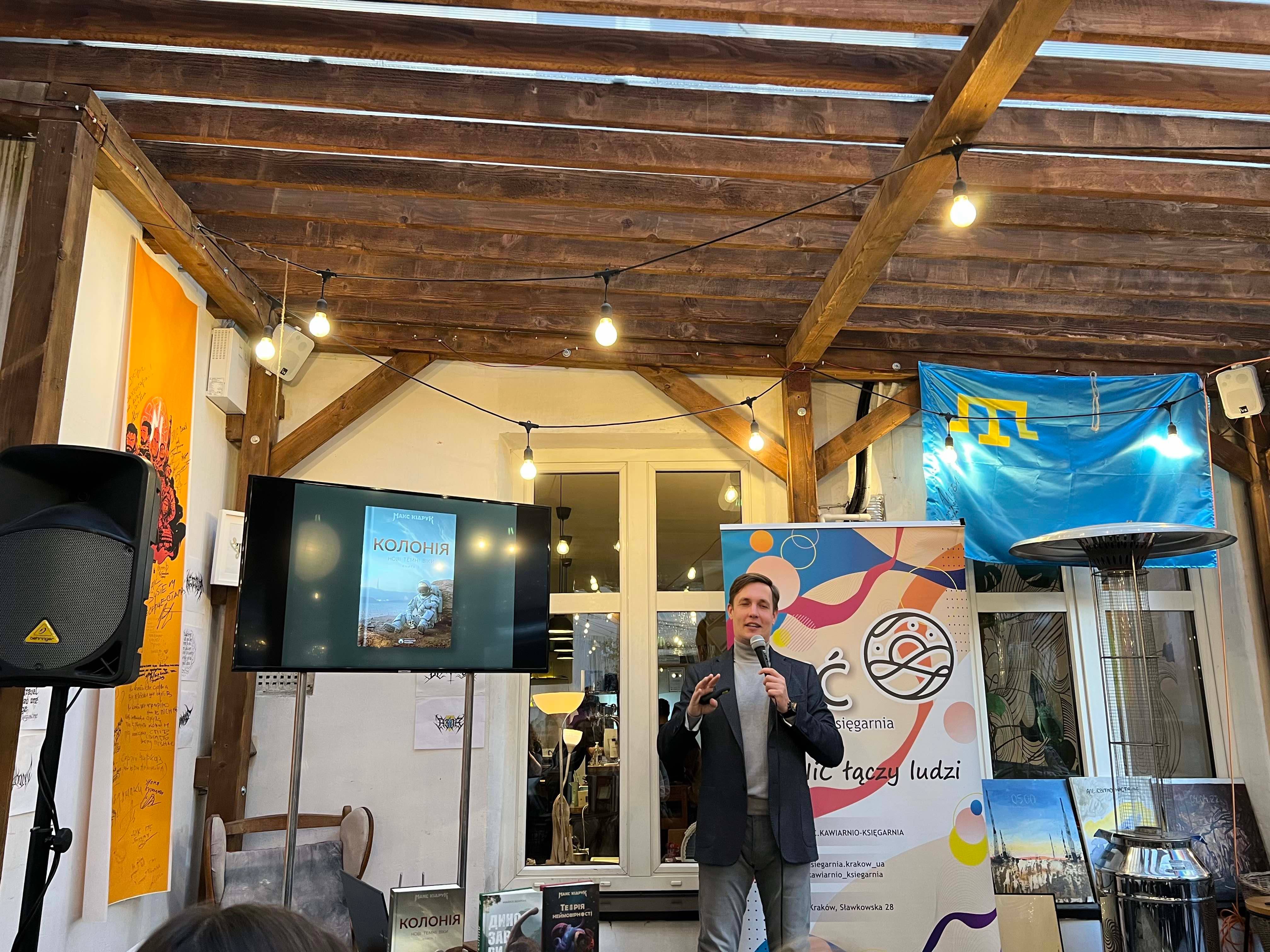
The second difference was the event format. Max Kidruk did not go for a standard moderated discussion but kicked off with the slides shown on the big screen and prepared his speech in advance instead. He followed his agenda without significant improvisations or off-topics. Immediately, the guests could feel the level of professionalism: very self-confident speaker, a well-structured and interesting speech, funny jokes, good presentation tempo to keep listeners engaged and entertained for the whole hour. I also noticed well-developed diction coming from Max Kidruk's radio host experience and I got a desire to study somewhere myself to sound so good.
During his presentation, the writer predominantly explained “the world” he created in the book, what was the message he wanted to convey, who were the main characters, and why they were like that. Also, he told about the publishing house that his wife and himself managed to create and what were their nearest creative plans.
So, the main insight for me was that a book presentation can also be delivered in such a format! It was an interesting experience from both sides: the reader and the beginner writer who tries to learn from more experienced colleagues. Definitely, this time I didn’t worry about the event, neither on the road nor at the meeting itself. Maybe because the author didn’t worry as well.
The third distinctive moment was that the autograph session began right after the presentation. This time there was no interaction with the audience, no chance for questions or further discussion. This was what I missed the most. Not only because I had a question to ask. I think that the vivid discussion eliminates this feeling of a formal event. Otherwise, it could be seen as a lecture at the university, where a cool professor arrived just in time, read his lecture, signed the attendance list, and immediately left the classroom.
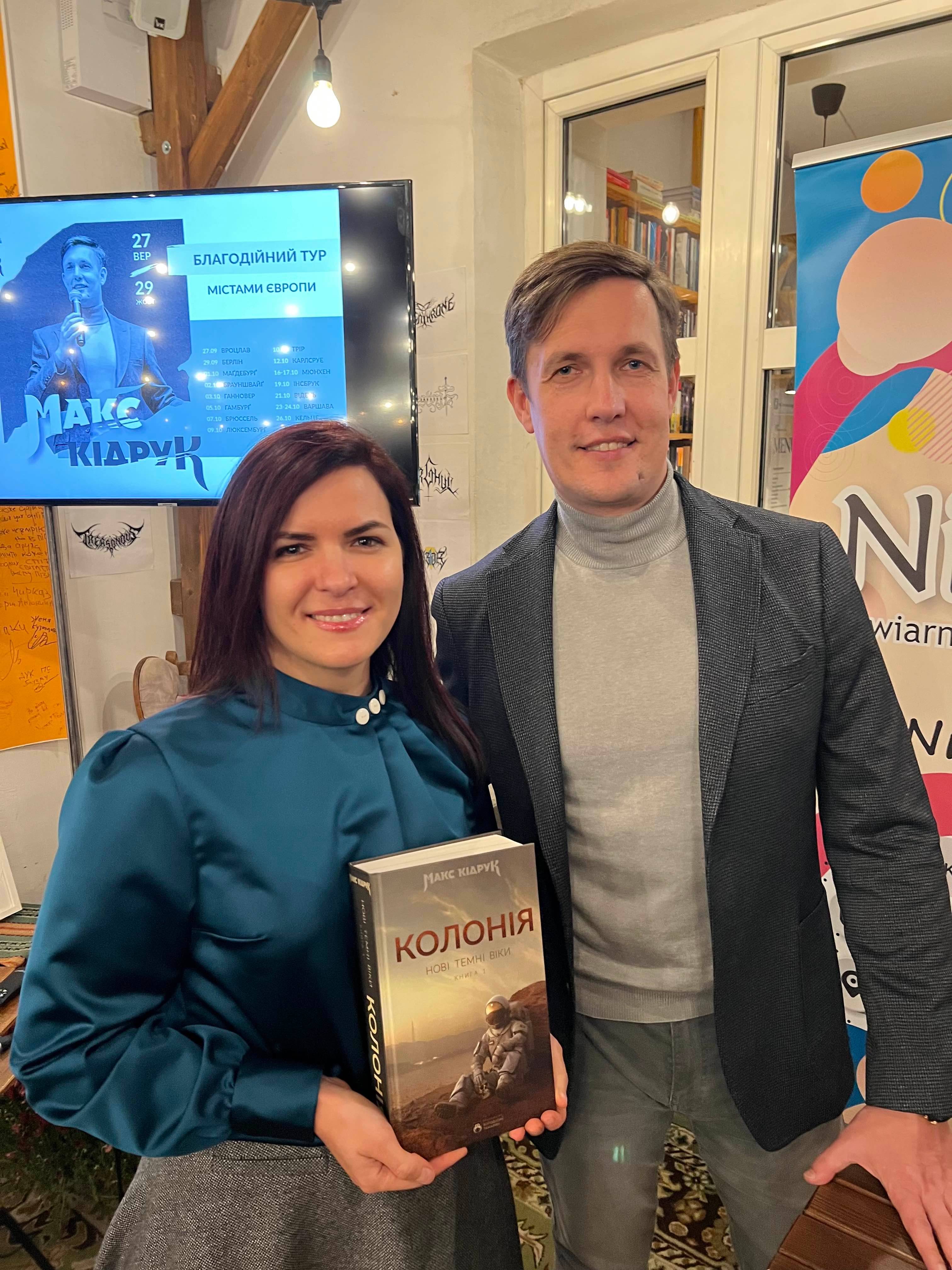
There was a huge queue to sign the book and me at the very end. I thought that it might take ages to wait for my turn, but the queue was moving very quickly. One minute per person at the maximum – the signature in the book plus the photo with the author. I kept catching myself thinking of how thoroughly the event was organized — all little details were considered. In a nutshell, one can observe the experience of the writer and his crew.
Overall, I liked the event. It was insightful and interesting from the anthropology point of view and content value. I definitely left the event with some new knowledge.
Evening with Tamara Duda, whose book influenced me
The only meeting when I was fully prepared. I bought the book “Daughter” much earlier and already read it.
I was really touched by some scenes about the war in Donbas covered in the book, the author’s sense of humor, and her writing style. In my review on Instagram, I mentioned that it was easy for me to “live” through the story, to be a part of it. And it's absolutely true.
Before the event, I even felt worried. I was so excited to meet closer with the author of the book which resonated with me so much.
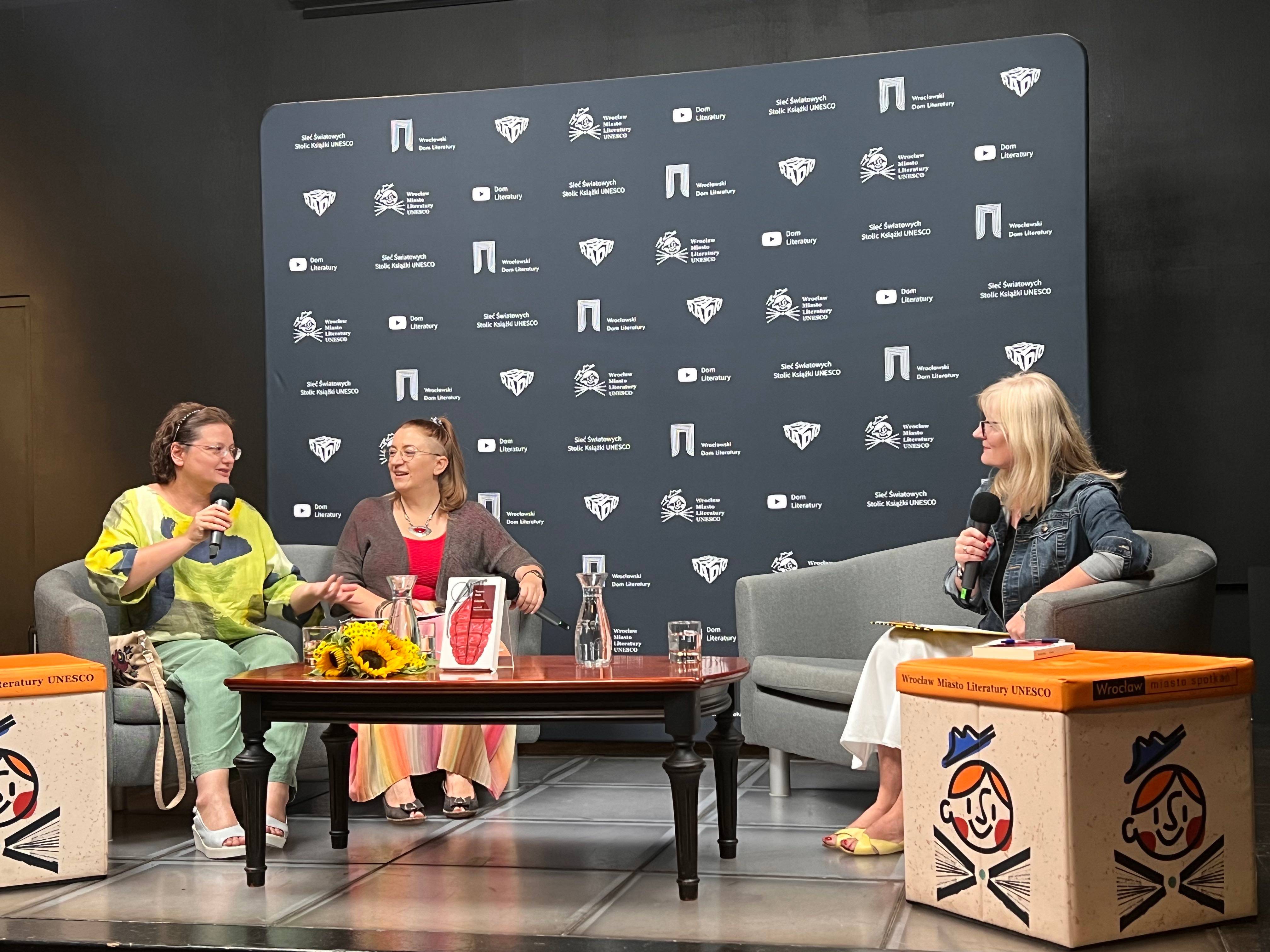
The event took place in the book cafe in quite cameral and warm atmosphere. The attendees were sitting relaxed: some of them were listening and drinking coffee, the others just listening carefully. The audience was predominantly female.
The event was moderated. Except for the moderator and the writer, there was a Polish language translator on the scene, as the event was also streamed to various local online platforms. In the first section of the meeting, the moderator asked great questions to reveal the writer’s personality. In the second part, there was a deep discussion of the book. It was extremely interesting and fascinating to observe this action: the talented writer with a great sense of humor on the stage, the moderator with her smart questions, and finally the interpreter who skillfully translated long answers [I could not remember the sentence of 10 words, but she was able to keep in mind 10 complicated sentences].
Thus, from the very warm and open conversation, I found out that Ms. Tamara likes humor a lot. She demonstrated it many times — both in her book and during the meeting. Even her creative pseudonym “Nut Seed” originated from a joke. She also shared the fact that behind her main character in “Daughter”, there is a true person who experienced most of the events described in the book. Some other characters also were created based on the stories of real people. The writer told a few stories about her visits to Donbas in 2014 and how she began volunteering. And much more. Her memories left no one indifferent, including myself. One could hear some listeners let their emotions go out and quietly cried.
It was very precious information for me as long as I'd never find those insights online. Also, I suddenly realized the more you know about the author, especially from live interaction, the more you feel connected with them. It kind of breaks an invisible wall between the writer and the reader, evokes sympathy, and pushes you to buy the following books. Because now you are well-aware who stands behind them.
After the moderated conversation there was a possibility to ask the questions. My voice was shaking when I commented own reflections on the book and my memories from 2014 and asked a question. Apart from giving some feedback on the book, I was curious of how she got the idea to write a debut book and where this determination to finish it came from. Ms. Tamara explained that she never planned to become a writer. But she was so deeply impressed, touched and captivated by the personality of the girl she knew from the volunteering activities and who later became a prototype of the main character, so she could not resist the idea to tell her story. Ms. Tamara was convinced other people must hear it. Paradoxically, in that case, the book decided instead of the writer that it should be definitely written.
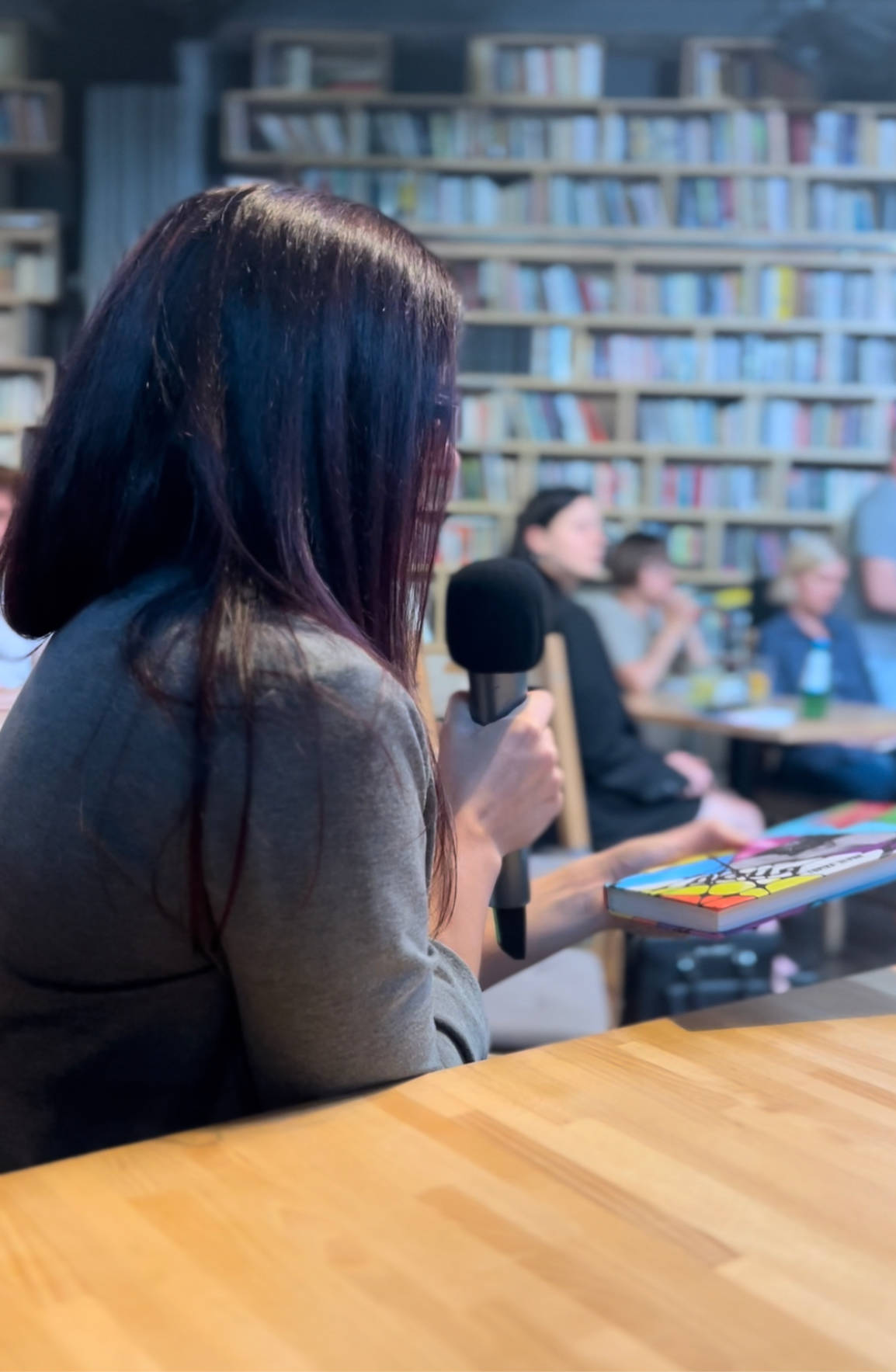
There was no book episode reading. Therefore, the event ended with an autograph and photo session.
I remembered the atmosphere of the event as such being on a bare nerve. It was due to the hard theme covered in the book, but also because of empathy shared by the attendees. Many of the guests had already read the book and we all were connnected by that knowledge. Absolute strangers suddenly became almost close relatives, even if only for the duration of the meeting. The intimacy of the event, the accessibility to the writer, and her openness made me feeling covered in the warm blanket which I refused to take off. I liked it so much, I wanted more.
Summary
After visiting the first three events I noticed that the format of such a meeting can be different. One presents the book in a classic way, while another prefers slides, prepared speech or video. Which atmosphere would prevail — a formal event or friendly conversation, it depends on the vision, desire and writer's personality and, perhaps, driven by the theme of the book.
After all, I made a conclusion, that a warm and sincere discussion between the writer and an interviewer (moderator, facilitator) and interaction with the readers — are the most valuable and interesting elements of the meeting with a writer. Among other benefits, it helps to build trust in the writer and a sense of community among the readers as the audience most probably shares similar values and ideas covered by the authors in their books.
***
The source of the picture on the blog cover is the official page of DCF on Facebook.